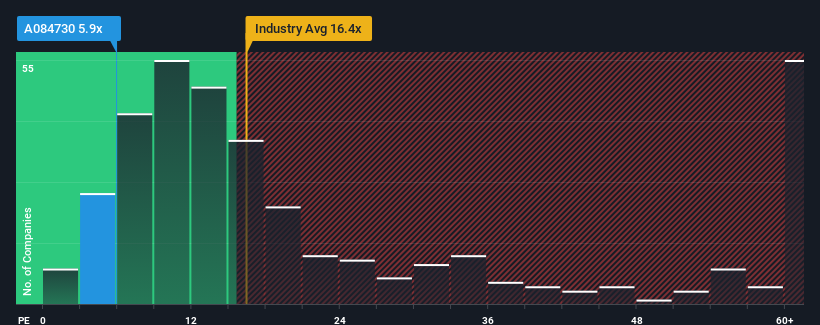- South Korea
- /
- Consumer Durables
- /
- KOSDAQ:A084730
Benign Growth For THINKWARE Corporation (KOSDAQ:084730) Underpins Stock's 26% Plummet
Unfortunately for some shareholders, the THINKWARE Corporation (KOSDAQ:084730) share price has dived 26% in the last thirty days, prolonging recent pain. Instead of being rewarded, shareholders who have already held through the last twelve months are now sitting on a 37% share price drop.
Although its price has dipped substantially, THINKWARE's price-to-earnings (or "P/E") ratio of 5.9x might still make it look like a strong buy right now compared to the market in Korea, where around half of the companies have P/E ratios above 12x and even P/E's above 25x are quite common. However, the P/E might be quite low for a reason and it requires further investigation to determine if it's justified.
With earnings growth that's exceedingly strong of late, THINKWARE has been doing very well. One possibility is that the P/E is low because investors think this strong earnings growth might actually underperform the broader market in the near future. If that doesn't eventuate, then existing shareholders have reason to be quite optimistic about the future direction of the share price.
View our latest analysis for THINKWARE

Is There Any Growth For THINKWARE?
THINKWARE's P/E ratio would be typical for a company that's expected to deliver very poor growth or even falling earnings, and importantly, perform much worse than the market.
Taking a look back first, we see that the company grew earnings per share by an impressive 234% last year. Pleasingly, EPS has also lifted 65% in aggregate from three years ago, thanks to the last 12 months of growth. Accordingly, shareholders would have probably welcomed those medium-term rates of earnings growth.
This is in contrast to the rest of the market, which is expected to grow by 31% over the next year, materially higher than the company's recent medium-term annualised growth rates.
With this information, we can see why THINKWARE is trading at a P/E lower than the market. It seems most investors are expecting to see the recent limited growth rates continue into the future and are only willing to pay a reduced amount for the stock.
The Bottom Line On THINKWARE's P/E
Having almost fallen off a cliff, THINKWARE's share price has pulled its P/E way down as well. It's argued the price-to-earnings ratio is an inferior measure of value within certain industries, but it can be a powerful business sentiment indicator.
We've established that THINKWARE maintains its low P/E on the weakness of its recent three-year growth being lower than the wider market forecast, as expected. At this stage investors feel the potential for an improvement in earnings isn't great enough to justify a higher P/E ratio. If recent medium-term earnings trends continue, it's hard to see the share price rising strongly in the near future under these circumstances.
It is also worth noting that we have found 1 warning sign for THINKWARE that you need to take into consideration.
If you're unsure about the strength of THINKWARE's business, why not explore our interactive list of stocks with solid business fundamentals for some other companies you may have missed.
Valuation is complex, but we're here to simplify it.
Discover if THINKWARE might be undervalued or overvalued with our detailed analysis, featuring fair value estimates, potential risks, dividends, insider trades, and its financial condition.
Access Free AnalysisHave feedback on this article? Concerned about the content? Get in touch with us directly. Alternatively, email editorial-team (at) simplywallst.com.
This article by Simply Wall St is general in nature. We provide commentary based on historical data and analyst forecasts only using an unbiased methodology and our articles are not intended to be financial advice. It does not constitute a recommendation to buy or sell any stock, and does not take account of your objectives, or your financial situation. We aim to bring you long-term focused analysis driven by fundamental data. Note that our analysis may not factor in the latest price-sensitive company announcements or qualitative material. Simply Wall St has no position in any stocks mentioned.
Have feedback on this article? Concerned about the content? Get in touch with us directly. Alternatively, email editorial-team@simplywallst.com
About KOSDAQ:A084730
THINKWARE
Provides location-based and connected services in North America, Europe, Asia, Oceania, and internationally.
Adequate balance sheet and slightly overvalued.
Market Insights
Community Narratives



